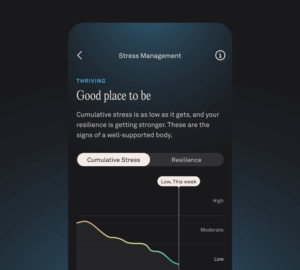- A good night’s sleep bolsters your resilience, or your ability to cope with stress.
- Sleep regulates your hormones, allows you to process emotions, and strengthens your immune system, among other factors that enhance resilience.
- Oura’s Daytime Stress and Resilience features provide a quantifiable measure of your body’s ability to cope with and recover from life’s difficult moments.
Sleep forms the foundation of good health. From your mood to your immune system, sleep plays a pivotal role in how your body functions — either poorly or optimally.
After a bad night of sleep, you’ve probably noticed you have a short fuse and lack patience. But this isn’t just because you’re tired. Research shows that sleep impacts your resilience — or your ability to handle stressors that inevitably crop up during the day.
| Member Tip: In the Oura App, you can monitor the relationship between your sleep and resilience using the Resilience feature. Compare your Sleep Score trends with your Resilience graph to see how changes in your sleep may have impacted your resilience levels, or vice versa. |
What Is Resilience?
In a general sense, resilience refers to your ability to cope with stress. In the Oura App, the Resilience feature gauges your body’s ability to withstand physiological stress and recover from it in the long term. This is detected through biometric data such as heart rate variability (HRV) and resting heart rate.
Importantly, your resilience level isn’t fixed. It’s continually evolving, based on factors like your lifestyle habits and physiological changes. Oura’s Resilience feature is designed to give you a longer-term picture of your body’s response to stressors.
READ MORE: Building Resilience: Improve Your Ability to Recover From Stress
What Happens When You Don’t Sleep Well?
A poor night’s sleep is like the first domino to fall in a chain reaction. Because you’re tired, you’re less motivated to go for a stress-relieving walk, more reliant on cortisol-jacking caffeine, and more distracted by social media when you should be sleeping.
If you continue to sleep poorly, studies show your immune function, cognitive performance, mood, hormonal balance, and more systems in your body can suffer – making it harder for you to recover from stress.
This results in low resilience levels, which can increase your risk of mental health disorders, burnout, cardiovascular disease, and high blood pressure.
“It’s a double-edged sword,” explains Elissa Epel, PhD, stress expert and Oura advisor. “Poor sleep drives stress, and high-stress arousal keeps us from sleeping well, so we’re constantly depleted.”
Luckily, consistently good sleep, on the other hand, can improve your resilience. Even better? The more resilient you are, the better you’ll sleep.
READ MORE: Why Sleep Matters & How It Impacts Your Health
| Member Story: After using the new Resilience feature, Oura member Nima S. saw that sleeping well improved his Resilience level by bolstering his body’s ability to recover from stress during the day. |
How Sleep Builds Resilience
“Poor sleep is a major highway between stress and experiencing the effects of it in your life,” says Epel. “You can bolster your resilience by helping you prevent sleep loss from stress.” Sleep promotes a number of important physiological processes that can enhance your resilience. These include:
1. Hormone Regulation
Poor sleep disrupts the normal rhythm of the stress hormone, cortisol, and other neurotransmitters, like dopamine and serotonin.
“When you don’t sleep well, your cortisol levels are elevated when you wake up in the morning,” explains Dr. Sara Gottfried, MD, precision medicine practitioner and Oura advisor. High levels of cortisol can impact your ability to recover from stress by keeping you in a stress-activated state, or fight-or-flight mode.
“Elevated cortisol levels can also disrupt the delicate tango between estrogen and progesterone, and can cause your thyroid to slow down, which can affect your metabolism,” Gottfried notes.
2. Brain Power
During sleep, your brain undergoes a number of restorative processes, such as the removal of toxic waste byproducts, memory consolidation, and emotional regulation. These vital processes boost your brain power and contribute to your resilience.
READ MORE: The Neuroprotective Benefits of Sleep
3. Immune Function
During sleep, your body releases cytokines – proteins that aid in the immune response. A strong immune response fortifies your resilience by making you less susceptible to illness and the effects of stress on the body.
One interesting study found that the immune system of resilient people (their “immunophenotype”) works differently from stressed people.
READ MORE: How Sleep Affects Your Immune System
4. Emotional Regulation
REM sleep plays a crucial role in how you process emotions and stressful experiences – which contributes to your resilience. In contrast, poor sleep is linked to mood disorders, a lack of empathy, and combative behavior.
What’s more: “Studies have shown that positive emotions trigger processes in your body that help to metabolize and overcome stress,” says Epel. “You can increase these positive emotions through deep rest states — achieved either in sleep or through breathing, meditation, or mindful practices.”
| Member Story: Oura member Brian K. noticed that his mood, empathy, and patience drastically improved once he started sleeping better. |
READ MORE: How Dreams Help Regulate Your Emotions and Reduce Stress
5. Motivation & Learning
How you sleep affects how you think. Embracing a growth mindset – seeking continuous learning and taking on new challenges – relies on having the motivation to do so. And to be motivated, you need to be well-rested! Poor sleep lowers motivation and fosters pessimism, creating a barrier to building resilience.
READ MORE: Your Mindset Matters: How to Build Resilience to Stress with a Growth Mindset
Improve Your Sleep to Enhance Your Resilience
Bolster your Oura Sleep Score — and in turn, your resilience level — by following the gold standards of good sleep.
- Focus on good sleep hygiene: Improve your sleep environment by incorporating blackout curtains, keeping the bedroom cool, and limiting food within two hours of bedtime.
- Align your bedtime with your chronotype: Understand your natural inclination toward being an early bird or night owl and adjust bedtime accordingly to optimize sleep duration.
| Member Tip: Oura members can find out their chronotype and ideal bedtime after 90 days of using Oura. |
- Experiment with sleep-inducing habits: Use Oura Tags to track habits such as having an evening chamomile tea or following an Oura in-app meditation to help you understand what contributes to a better night’s sleep.
RELATED: How Stress Affects Your Sleep











